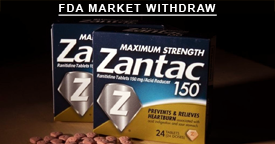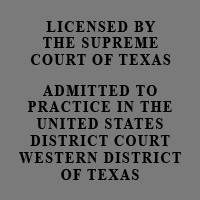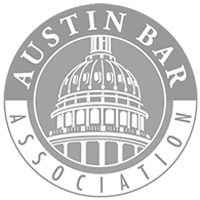Texas Zantac Cancer Lawyer Reviews Zantac Cancer Claims and Represents People Who Have Taken Zantac or other Ranitidine Heartburn Medications and Have Developed Stomach Cancer, Bladder Cancer, and Other Types of Cancer by Texas Zantac Cancer Lawyer and Ranitidine Heartburn Medication Cancer Lawsuit Attorney Jason S. Coomer

Texas Zantac Cancer Lawyer, Jason Coomer, represents individuals that have been diagnosed with cancer after taking the heartburn medication. Recent scientific tests show that several ranitidine heartburn medications sold to millions may cause an increased risk of cancer. More specifically, the Zantac heartburn drug can cause an increased risk of bladder cancer, stomach cancer, and several other types of cancer. Further, these heartburn medications contain the carcinogenic compound NDMA. Zantac and other ranitidine antihistamine pills react to heat and often develop high levels of NDMA. A Texas Zantac lawyer can advise you regarding your legal rights when it comes to a Zantac cancer lawsuit.
For more information on this topic or for a review of a potential Zantac cancer claim or heartburn medication cancer claim, please contact Texas Zantac cancer lawyer, Jason Coomer, or use our online submission form.
First of all, some helpful FAQs to explain the basics about Zantac cancer lawsuits:
Q1: Is there a lawsuit against Zantac?A1: Yes. Over 140 cases have been sent to a Southern District of Florida court. A Texas Zantac cancer lawyer can help you file a lawsuit or claim.
Q2: Why was Zantac recalled by the FDA?A2: On April 1, 2020 the U.S. Food and Drug Administration requested the removal of all Zantac Ranitidine heartburn medications from stores due to N-Nitrosodimethylamine (NDMA) contanmination.
Q3: Does N-nitrosodimethylamine (NDMA) cause cancer?A3: Ranitidine heartburn drugs may create NDMA which causes an increased risk of several types of cancer. More specifically, NDMA increases the risk of bladder and stomach cancer.
Q4: Will there be a Zantac cancer settlement?A4: The lawsuits allege personal injuries and if successful there could be a Zantac heartburn medication settlement.
Texas Zantac Cancer Lawyer Reviews Several Types of Cancer Lawsuits
Several contaminated heart burn medications contain a known carcinogen, NDMA. NDMA causes cancer. Testing has shown that Zantac and Ranitidine pills contain NDMA. As such, Zantac and Ranitidine can cause cancer in patients. People who digest this carcinogenic have an increased risk of cancer. More specifically, the FDA classifies NDMA as a potentially dangerous cancer-causing agent. Further, ingested NDMA increases a persons risk of liver cancer, kidney cancer, and stomach cancer. It also increases the person’s risk of bladder, colorectal, esophageal, intestinal, ovarian, pancreatic, testicular, and uterine cancer.
People with cancer or at risk of cancer should avoid ingesting carcinogenic materials. Further, people who take ranitidine heartburn medications and have been diagnosed with cancer may have a claim.
Zantac and Other Ranitidine Heartburn Medications May Contain High Levels of NDMA
The over-the-counter heartburn medication, Zantac, and other heartburn drugs based on the generic drug ranitidine contain the carcinogenic compound NDMA. Zantac is an over-the-counter heartburn medication that is also available in stronger forms as a prescription to treat more serious stomach and ulcer conditions.
Often, the active ingredient in Zantac and Ranitidine were manufactured in warm climates. Additionally, the ingredients and pills were stored and transported using non-climate controlled techniques. This creates a hot and humid environment for the unstable ranitidine molecule to reformulate. The reformulation of the active Zantac ingredient rebuilds itself into NDMA. Further, NDMA also forms after ingestion when the pill mixes with stomach acids. In summary, several of the factors that cause the formulation of NDMA in Zantac are high temperatures during distribution and storage as well as time and ingestion.
These ranitidine heartburn drugs include Zantac 75, Wal-Zan 150, Wal-Zan 75, Acid Reducer (ranitidine), Zantac Maximum Strength, Heartburn Relief (ranitidine), Zantac, and Acid Control (ranitidine). Users of these heartburn medications should check with the FDA to determine if their drug has been recalled or contaminated. Further, they should consult with their healthcare provider regarding alternative medications and cancer screenings.
The Compound NDMA (N-nitrosodimethylamine)
The FDA classifies the compound NDMA as a potentially dangerous cancer-causing agent. The beneficial uses of NDMA include use in gasoline and rocket fuel. It also stabilizes industrial materials and helps lubricants. Regardless, consumers should avoid heartburn medications with high levels of NDMA.
Zantac and Other Ranitidine Heartburn Medications React to Heat and Can Produce NDMA
Zantac and other heartburn medications contain the active ingredient ranitidine. Unfortunately, ranitidine commonly reacts with itself when it is heated. Further, this ranitidine reaction creates the carcinogenic compound NDMA. More specifically, these drugs react through body heat and heat created through transportation. Thus, end users often ingest these drugs causing an increased risk of cancer.
FDA Recall of Zantac and Other Ranitidine Heartburn Drugs
The U.S. Food and Drug Administration (FDA) regulates the sale of drugs in the United States. Further, the FDA protects consumers from dangerous contaminated and adulterated drugs. As such, the agency prohibits drugs with high levels of NDMA. The agency also advises against daily ingestion of high levels of NDMA.
The FDA reviews tests and tests drugs suspected of being contaminated or adulterated. As such, based on these tests, the FDA issues recalls and warnings regarding contaminated and adulterated drugs. In the case of Zantac and other heartburn medications, the FDA announced tests showing the presence of N-nitrosodimethylamine (NDMA) in ranitidine.
As such, based on Zantac and other ranitidine samples, the FDA issues recalls of contaminated heartburn medications. Further, the FDA works with contaminated heartburn medication manufacturers to warn users of the health risk. The FDA also warns healthcare professionals regarding these adulterated drugs.
For more information on FDA recalls, please go to the following webpage FDA Zantac NDMA Recall Information.
The U.S. Food and Drug Administration Requests The Removal of All Zantac Ranitidine Heartburn Medications From Stores
In September 2019, the FDA reported the discovery of NDMA in Zantac (ranitidine). In its announcement, the FDA found the levels of NDMA contamination to be low. However, contamination was more than 3,000 times higher than the FDA’s limit. Experts say that there is a discrepancy in lab testing and the level of NDMA may be significantly higher when ranitidine is introduced into the human body. On April 1, 2020 the U.S. Food and Drug Administration requests the removal of all Zantac Ranitidine heartburn medications from stores.
Retailers Pull Zantac from Shelves
Many retailers pull Zantac and other heartburn medications from their shelves. These retailers include the supermarket and drug store chains. after tests found a potentially cancer-causing substance in the ingredient ranitidine. If you a doctor diagnosed you or a loved one with cancer, contact us to schedule a free Zantac lawsuit consultation with a Rinitidine or Zantac cancer lawyer.
Zantac is an over-the-counter heartburn medication that is also available in stronger forms as a prescription to treat more serious stomach and ulcer conditions. However, recent tests have shown that Zantac’s active ingredient ranitidine contains NDMA, a substance that is potentially carcinogenic to humans. If you or a loved one took Zantac and were diagnosed with cancer, please contact a heartburn cancer lawyer to review your potential case. Texas heartburn medication lawyer Jason Coomer is currently investigating claims for NDMA-related cancers. As a Texas Zantac lawyer, he may be able to help you get the compensation you deserve.
Texas Zantac Cancer Lawyer Reviews Ranitidine Heartburn Drug Cases and Other NDMA Ingestion Cases Which Cause An Increased Risk of Several Types of Cancer
Ranitidine heartburn drugs may create NDMA which causes an increased risk of several types of cancer. More specifically, NDMA increases the risk of:
- Liver cancer
- Colorectal cancer
- Stomach cancer
- Bladder Cancer
- Esophageal Cancer
- Intestinal Cancer
- Kidney Cancer
- Ovarian Cancer
- Pancreatic Cancer
- Stomach Cancer
- Prostate Cancer
- Uterine Cancer
People with above forms of cancer should determine if they ingested NDMA. Further, they should also stop using Zantac and other Ranitidine heartburn medications. They should also discuss alternative heartburn medications with their healthcare providers. Indivduals should seel legal advice from a Zantac cancer lawyer if they have been diagnosed with cancer.
They should also gather their medical history and history of heartburn medication use. With this information, people with cancer caused by NDMA can have their potential cases reviewed. Further, families of those who died from cancer should also determine if their loved one used these products. If so, they should gather their death certificate and have their potential case reviewed.
Texas Zantac Cancer Lawyer and Texas Ranitidine Heartburn Medication Cancer Lawyer Reviews Cancer Lawsuits
Texas Zantac Cancer Lawyer reviews Zantac cancer lawsuits. He reviews cancer cases and cancer death cases. More specifically, he reviews cancer cases of people who have been diagnosed with cancer and have used Zantac or other heartburn drugs. Further, he reviews cancer death cases from families who have lost a loved one to cancer. These cases require use of Zantac and other ranitidine heartburn drugs.
On all cancer cases, he requires documentation of a cancer diagnosis and history of ranitidine heartburn medication use. Zantac cancer lawyer, Jason Coomer can help individuals seek their pharmacy and medcial records through a HIPPA release form. Then he can review the medical and pharmacy records to determine if a cancer lawsuit or claim should be filed.
History of Zantac and Ranitidine Heartburn Medications Use
Drug companies began selling ranitidine heartburn medications in 1983. These manufacturers sell these drugs around the world. Further, they make vast amounts of money by selling these drugs. More specifically, these heartburn medications began as prescription drugs, but later became over-the-counter and generic. Millions of people use or have used these medications. Heavy users and long term users of these drugs develop higher risks of several types of cancer.
These manufacturers market these medications as a safe treatment for heartburn, acid indigestion, sour stomach, GERD and other conditions. Further, for decades doctors commonly use these drugs to treat heartburn conditions. In fact, doctors write more than 15 million prescriptions for ranitidine every year. Additionally, This millions of consumers buy these drugs over the counter.
Texas Zantac Cancer Lawyer and Texas Ranitidine Heartburn Medication Cancer Lawyer Commonly Works with Other Zantac Cancer Lawyers
As a Texas Zantac Cancer Lawyer, Jason Coomer commonly works with other Zantac cancer lawyers on lawsuits throughout Texas and the United States. They commonly work on large product liability suits that severely injure or kill consumers. For more information on this topic or for a review of a potential Zantac cancer claim or heartburn medication cancer claim, please contact Texas Zantac cancer lawyer, Jason Coomer, or use our online submission form.
Many ranitidine heartburn medications react to heat and create a carcinogenic compound NDMA. Further, ingestition of this compound causes an increased risk of stomach cancer, bladder cancer, and other forms of cancer. People who frequently use heartburn medication should check to determine if ranitidine is in their medication. Further, people who have used ranitidine heartburn medication for years, should be aware of this heartburn medication cancer alert and consult their medical providers about a potential increase risk of bladder cancer, stomach cancer and other forms of cancer.
Heartburn Medication Cancer Alert Ranitidine Heartburn Medications React to Heat and Can Produce NDMA
Heartburn medications that contain the active ingredient ranitidine may cause an increased risk of cancer. Further, the FDA recently found that many ranitidine heartburn medications commonly contain the carcinogenic compound NDMA. Unfortunately, the ranitidine in these heartburn medications commonly reacts with itself when it is heated and creates the carcinogenic compound NDMA. More specifically, these drugs react to heat during transportation including being transported to stores throughout Texas, being transported from stores, or being carried by users. Further, body heat can also cause the heartburn medications to react causing an increased risk of cancer.
Ranitidine Heartburn Medications May Cause Increased Risk of Stomach Cancer, Bladder Cancer, and Other Types of Cancer
Many over-the-counter heartburn medications containing ranitidine including Zantac and the generic drug ranitidine may cause an increase risk of stomach cancer, bladder cancer, or other cancer. These ranitidine heartburn drugs include Zantac, Zantac 75, Wal-Zan 150, Wal-Zan 75, Acid Reducer (ranitidine), Zantac Maximum Strength, Heartburn Relief (ranitidine), Zantac, and Acid Control (ranitidine). Users of these heartburn medications should check how their heartburn medications were stored and with the FDA to determine if their drug has been recalled or contaminated. Further, they should consult with their healthcare provider regarding alternative heartburn medications and if a cancer screening may be helpful.
Zantac (Ranitidine) Products Liability Litigation Lawyer
The Joint Panel on Multidistrict Litigation (MDL) has decided to consolidate Zantac actions before Honorable Robin L. Rosenberg in federal court. This will allow for the pretrial proceedings to be coordinated and consolidated. Centralization allows the panel to assign this nationwide litigation to a forum with the necessary judicial resources and expertise to manage this the Zantac (ranitidine molecule) litigation efficiently and in a manner convenient for the parties and witnesses. Many types of products liability litigation actions are assigned to a MDL. As lawyers, Jason Coomer and his co-counsel have extensive experience in working on cases that have been consolidated into Multidistrict Litigation in various areas of the country.
The Carcinogenic Compound NDMA Increases A Person's Risk of Cancer
The FDA classifies the compound NDMA as a potentially dangerous cancer-causing agent. The beneficial uses of NDMA include use in gasoline and rocket fuel. It also stabilizes industrial materials and helps lubricants. Regardless, consumers should avoid heartburn medications with high levels of NDMA.

For questions regarding Ranitidine heartburn medication lawsuits please send an email message to Texas Zantac Cancer Lawyer, Jason Coomer or use our online contact form.
Feel Free to Contact Us with any Questions
Associations




